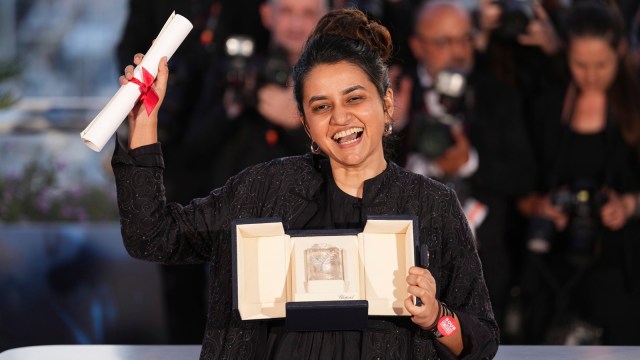
Some evenings are magical. It will take a while to recover from the euphoric sight of Payal Kapadia and her wonderful cast — Kani Kusruti, Divya Prabha and Chhaya Kadam — receiving the Grand Prix award for All We Imagine As Light at this edition of the Cannes Film Festival.
It may not have been the coveted Palme d’Or, but making the second spot in one of the toughest competition line-ups is not too shabby. Unless you have been living under a rock, or are oblivious to the happenings in the cinematic sector, you would have heard enough about Kapadia’s debut feature ending a 30-year dry spell (Shaji N Karun’s Swaham was part of the Cannes competition in 1994). And the win makes it a historic first for an Indian filmmaker who just happens to be a woman: It doesn’t get bigger than Cannes.
But after the dust settles down, as it inevitably will, the most obvious question will begin raising its pesky head: So what happens now? How will it change things for Indian cinema? Or, for Kapadia? Or will everything default right back to the status quo, in which the win will be seen as a flash-in-the-pan, once-in-a-lifetime achievement? A can-can at Cannes, and nothing more?
I’m going to stick my neck out and say that this win is truly a game-changer. To raise a victorious flag for an Indian film at Cannes, under the glare of global media, brings with it a huge spike in awareness of India’s “other” kind of cinema, which is aligned with global art-house practices. After the press screening of Kapadia’s film, so many fellow critics told me, with an air of real surprise, “Oh we didn’t know that this kind of film can also be made in India.”
One film cannot, and should not be expected to, shoulder the responsibility of changing the perception that all Indian films are song-and-dance stompers. But there’s no doubt that the ecstatic Cannes reception of All We Imagine As Light will help shift that needle, and even more importantly, hold out hope for other Indian filmmakers who want to tread the tough path of independence.
Again, it is nobody’s case that a Cannes win will automatically open doors to a theatrical release back home for Kapadia’s film. Or, for that matter, any other film that chooses to privilege substance over stars. A famous director once told me that any film that comes with “those leaves” (the pretty quote marks that accompany the details of the number of prestigious film festivals it has been screened at) spells automatic box-office disaster.
The fact that Kapadia did not have to depend upon the Mumbai mainstream industry’s rigid financing rules — gotta have stars, everything else be damned — has helped her make the film without any external interference. But how many of the same people who are lauding her win, helped no doubt by red carpet visuals, will show up and fork out for a multiplex ticket, if it does get a release?
And that would go for the rest of the Indian entries at the festival: British-Indian director Sandhya Suri’s Santosh, a trenchant look at law and order in a north Indian town through the eyes of a newbie female cop played by Shahana Goswami, would have to go up against the “showing-India-in-a-bad-light” hardliners. As would UK-based Indian director Karan Kandhari’s madly funny Sister Midnight, which has Radhika Apte headlining an unconventional Indian bride with strange appetites. Will the celebratory chatter surrounding Anasuya Sengupta’s Best Actress award for her striking performance as an on-the-run sex worker, in Bulgarian director Konstantin Bojanov’s The Shameless (in the Un Certain Regard section), translate into a spate of parts?
While the box office is no arbiter of merit, and in several instances, it is the dispiriting reminder that cinematic excellence of the kind programmed at A-list film festivals has nothing to do with fat profits, the Cannes celebration can be rendered hollow if these films do not get to be seen in the country they were made.
Some of the best Indian films made in the last few years have gone straight to streaming platforms. My hope, and the hope of the billion people who cheered when Kapadia held aloft her prize, exhorting the Cannes festival not to wait another 30 years to have another Indian film, is that her winner gets to see the light of day. And that we don’t just have to imagine the future.
shubhra.gupta@expressindia.com
© The Indian Express Pvt Ltd
First uploaded on: 27-05-2024 at 14:18 IST


